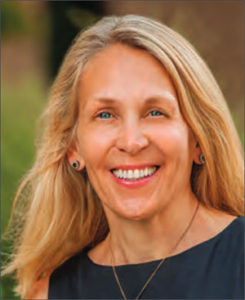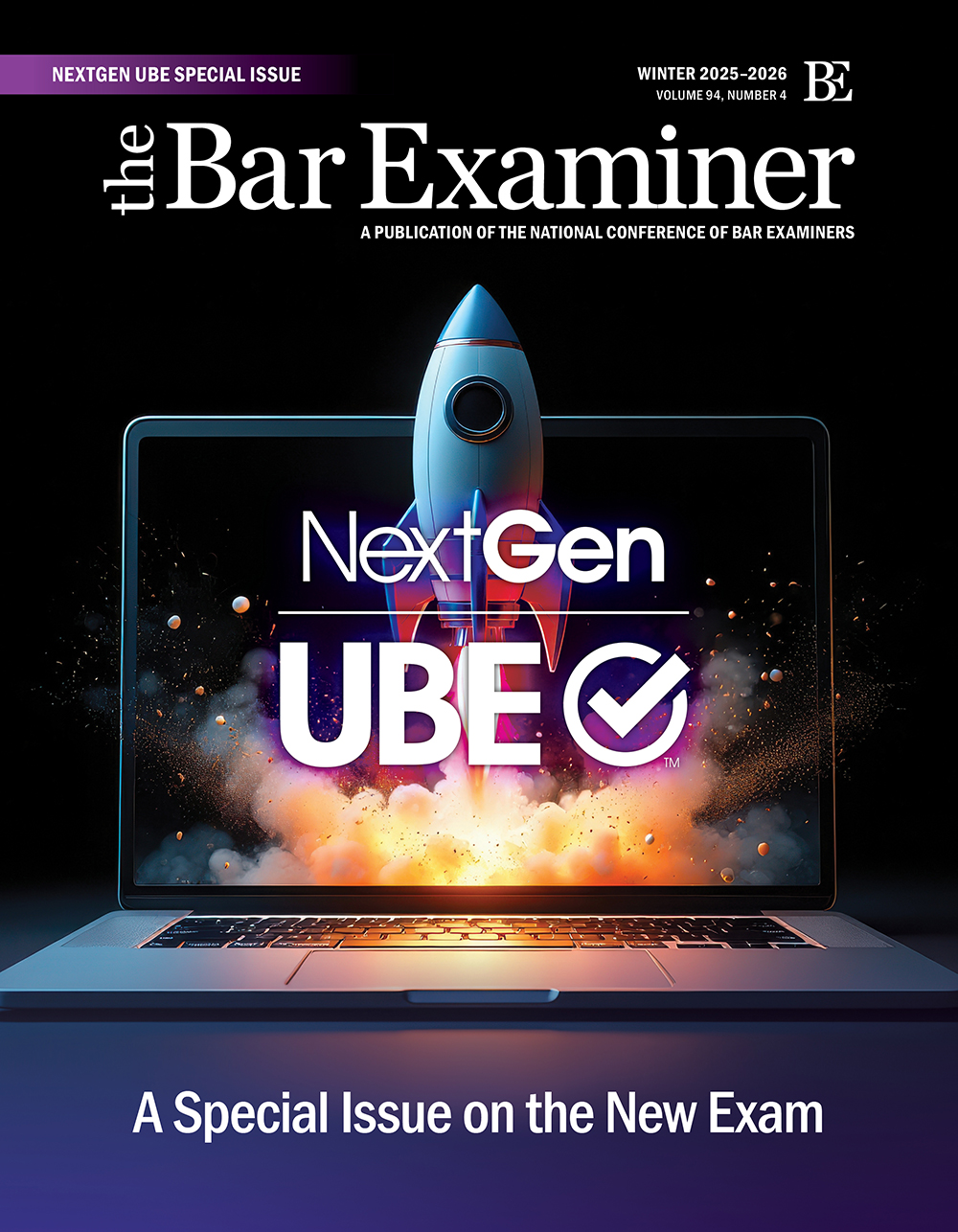This article originally appeared in The Bar Examiner print edition, Summer 2022 (Vol. 91, No. 2), pp. 3–5.By Judith A. Gundersen
Today’s Work, Tomorrow’s Lawyers
As I sit down to write this column, the January 6th hearings and the end of the SCOTUS term are making headlines and causing social media buzz. #Hearsay is trending, as are posts by law students about the impact of recent SCOTUS decisions on their lives and on their preparations for the bar exam. Just as these aspiring attorneys are deep into studying, it seems that both the law and our government are changing so rapidly that it is hard to keep up. Our newly licensed lawyers will enter a national legal environment that has changed dramatically during the short time they were in law school; those changes have both personal and professional implications that we are still working to understand.
Leading up to the July 2022 bar exam, our staff and drafting committees had conversations about what guidance NCBE could give examinees about the decisions coming out of this SCOTUS term. As the term was wrapping up, NCBE released a brief statement and encouraged jurisdictions, law schools, and bar prep companies to share it with examinees: examinees taking the NCBE-developed July 2022 MBE, MEE, and MPT will not be required to be familiar with this term’s SCOTUS decisions.
Given the momentous decisions that were due to be released, we published this statement to make sure that candidates knew they would not have to learn and apply new Constitutional Law doctrine on the upcoming July bar exam.
The sections of the bar exam that NCBE develops are prepared over several years and are typically finalized well in advance of each year’s Supreme Court opinions. The volunteer legal experts who draft NCBE’s bar exam questions are highly attuned to cases wending their way to the Court and make every effort to avoid testing on concepts that are before the Court for review. In the extremely rare instance that the MBE drafting committees—which are composed of law faculty, practitioners, and judges—might include a legal concept invalidated by a recent decision, the conflicting material would be addressed during grading and/or scoring of the exam. Examinees should remain confident that decisions from a current term that directly affect doctrine will not be tested immediately.
As a result of several of SCOTUS decisions this term, a small number of attorneys, examinees, and even law professors have advocated via social media for the removal—one assumes temporary—of Constitutional Law from the current bar exam. I would argue, though, that our democracy relies on a robust understanding of the framework upon which its very existence depends. At a time when alleged illegal and unconstitutional acts are under investigation in the US House, we need lawyers who will understand and uphold the Constitution and the rule of law. Admitting new lawyers who are competent, ethical, and diverse is critical to ensuring the democratic functioning of and full participation in our political system.
Lawyers are more important than ever, and so are all of you who ensure that the legal profession thrives: those on courts and in admissions who admit new lawyers to serve the public; law schools, law faculty, and staff who educate tomorrow’s lawyers and inculcate them with democratic ideals and knowledge about the law’s crucial role in protecting democracy and its people; and tomorrow’s lawyers, to whom I offer my best wishes for the exam and your entry to the profession, which safeguards a government of all people, by all people, and for all people.
The July 2022 Exam
As I write this, our Test Operations team is knee-deep in preparing for the July exam by finalizing exam material shipment orders and gearing up for all the post-exam scoring work ahead. They have prepared hundreds of customized materials for candidates with test accommodations requiring specially formatted materials. And our Investigations team is logging long hours to ensure that candidate character and fitness applications we help process for jurisdictions move along expeditiously.
We are very excited that Pennsylvania will administer its first UBE this summer. Pennsylvania will be the 40th UBE jurisdiction, with Michigan to follow in February 2023. To date, over 200,000 examinees have earned a portable UBE score, and close to 40,000 have transferred their scores and gained admission to another jurisdiction without having to take another bar exam.
As we approach the July exam, all jurisdictions are proceeding with an in-person administration. We stand at the ready in the event a natural disaster or COVID emergency order prevents any jurisdiction from administering in person.
Appreciations and Welcomes for a New Board Year
This time of year signals a change in the NCBE Board of Trustees and Council of Bar Admission Administrators (CBAA) leadership, and it is also when we welcome new members to the NCBE Board. It is a bittersweet time for me, as Bucky Askew rotates off the NCBE Board as past chair. We’ll all miss his wise counsel, wry sense of humor, and the kindness he shows everyone.
Sue Richards’s term as chair will conclude in August, but she will remain on the Board as immediate past chair. I have so enjoyed working with Sue this past year. She has brought a wealth of knowledge about jurisdiction character and fitness investigative processes from her volunteer work in Ohio. Her initiative to conduct a multiyear study in this area is an important one. I am grateful for her leadership in this and in many other areas in which NCBE has a role. Sue, like Bucky before her, has provided sage guidance and a steady hand during this time of development on the next generation of the bar exam and a slow but steady emergence from the pandemic.
Incoming chair Tim Wong of Minnesota is geared up with excellent committee appointments and charges to those committees for the year ahead. I look forward to working with Tim. He became involved in bar admissions 18 years ago as a grader and a member of NCBE’s Technology Committee; and, except for a brief break when he was working in Hong Kong, Tim has continued to serve the legal profession as a member of the UBE Committee, the MEE/MPT Committee, and the Education Committee—volunteer service he completed before joining the NCBE Board in 2015. Tim is also a member of the Implementation Steering Committee for the next generation of the bar exam, so he is well versed in its developments.
Thank you to Bucky, Sue, and Tim for their leadership of and loyalty to NCBE, and for their commitment to serving the profession.
CBAA leadership also changes in August. We thank Brad Skolnik, Executive Director of the Indiana Office of Admissions and Continuing Legal Education, for his service to the admissions community. Brad has led CBAA membership during an exciting time—a return to in-person meetings and programming. He has also warmly welcomed new administrators into the fold and has helped them get up to speed. We’ve very much benefitted from his participation at NCBE Board meetings this past year.
Jeff Shipley, Secretary and Director of the Maryland State Board of Law Examiners, takes the CBAA chair position in August. He is a leader among administrators. We are all eager to work with him on the Board and excited for his term as CBAA chair. Welcome, Jeff!
Finally, we are happy to announce our two new NCBE Board of Trustees members. Professor Tim Davis, the John W. and Ruth H. Turnage Professor of Law at Wake Forest University Law School, is longtime chair of the MBE Contracts Drafting Committee and a member of NCBE’s Diversity and Inclusion and MPRE Committees. His knowledge of our exams and his experience as a professor bring an important perspective to our Board.
Lisa Perlen, who is Executive Director of the Tennessee Board of Law Examiners, joins the Board following service on NCBE’s UBE Committee, and before that, the Character and Fitness Committee. Lisa had a long career in court administration before joining the Tennessee Board in 2012. Lisa brings an important bar admission administrator perspective to our Board; we highly value our relationships with admissions staff across the country.
On behalf of our current Board members and our staff, we thank Tim and Lisa for accepting our invitation, and we look forward to working with them.
Until the next issue,

Judith A. Gundersen
Contact us to request a pdf file of the original article as it appeared in the print edition.








